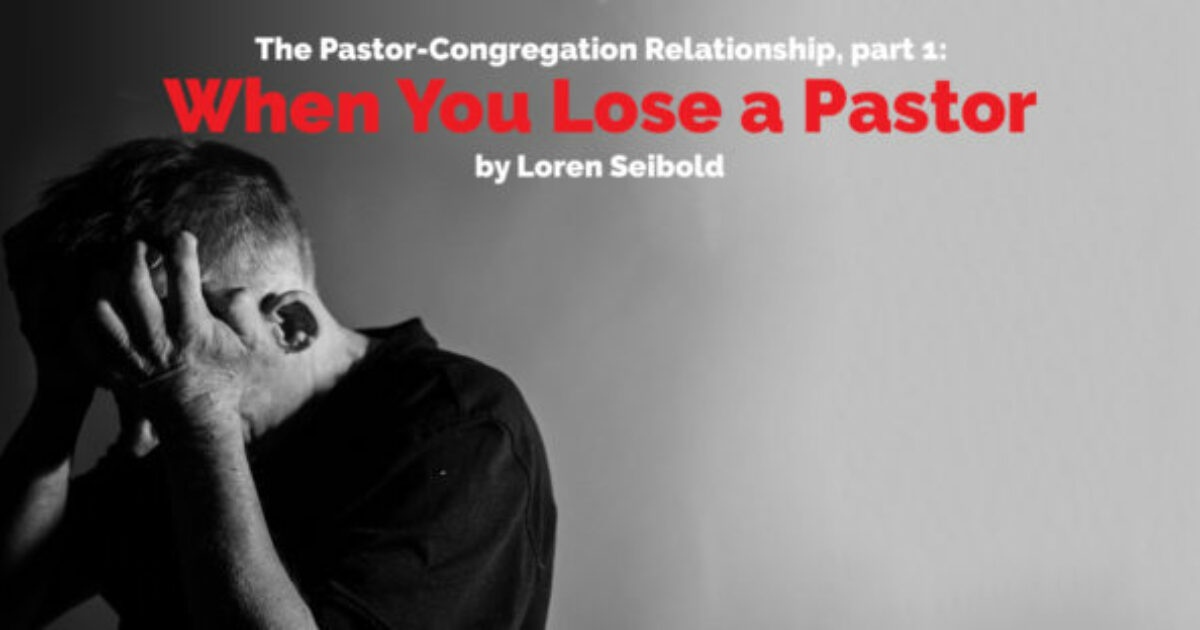The Pastor-Congregation Relationship: When You Lose a Pastor
by Loren Seibold | 18 December 2020 |
Now and then we hear of a pastor who was dismissed for misbehavior, usually the cause being, as one friend described it, “honey or money.” Adventist Today doesn’t normally report such stories unless they contain criminal acts that have already brought them to the attention of the public news media.
But we all know it happens. It is sad for everyone concerned. Of course, pastors shouldn’t do such things. But they do. Oddly, stealing from the church usually doesn’t upset people quite as much as the other problem—and I’m not here going to go digress into the whole discussion of the moral dimensions, the honesty dimensions, and the power dimensions, of men in high positions taking advantage of women.
My thoughts on this topic were stimulated when, reading someone’s account of how their pastor had been dismissed from the ministry for one of these causes, a commenter wrote, “Don’t worry about it. Pastors are easy to replace.”
Let’s start there. Are pastors easy to replace? Can one be taken out and another put in, like replacing the water pump in your car?
Moving the ministry
In fact, it is fairly common for Adventists to think that church problems can be fixed by simply replacing the pastor. I think it’s a legacy of how for decades we churned pastors through churches so that no one ever got to stay very long in any one place. We may have inherited this from our leaders who’d been Methodists. See a 19th-century novel called The Damnation of Theron Ware for a description of how Methodist pastors were placed and moved every camp meeting in the 19th century—and in our denomination, as late as my lifetime.
Young pastors don’t believe me when I tell them how badly pastors were once treated. A few years ago I had a heartbreaking conversation with an elderly couple who had started out in ministry. They told me how the conference president had moved them every year. How the moving van showed up at their home one night unannounced when the wife was 8 months pregnant, and she had to move instantly—the next day. After being shuttled about Ohio for several more years, they finally quit ministry.
I confirmed their story with others, and indeed, it sprang from a spectacular leadership failure: many at that time had suffered the same. (It made me think of Aunt Sevvy’s recent answer to an employee who asked why leadership in the church is often so poor.) When this elderly couple talked to me, they were both only a few years from their deaths. They told this story with such tremendous sadness, it seemed to me a sort of final outpouring of grief for their disappointment in having to quit doing what they felt God had called them to do.
I remember my first conference president saying, “We don’t keep you long in any place because we don’t want the church people to get more attached to you than to the denomination.” He was terrified of pastors having a following, though he had no such compunctions about his place in the church hierarchy.
Why anyone wants to enter the profession is a tribute to how dedicated many of us have been to ministering Christ’s love to people.
The reset button
Through the years, congregations came to believe that the solution to congregational problems of any kind is a new pastor. Move one out, move another one in. I was once in a congregation where a small set of people had decided that I wasn’t a sufficiently conservative Seventh-day Adventist, and set about creating so much tension in the church that it was nearly unbearable. Their accusations were unkind and dishonest, but the trouble they created was real. I remember one person saying to me, “I don’t think it’s your fault, but pastors come and go, and if you go, someone new will come and we’ll all be happy again.”
We Americans have a national leader who, because he didn’t get his own way, is trying to destroy everything in his path on the way out. I didn’t want to leave that kind of legacy, so I quietly slipped away.
Did my leaving solve the congregation’s every problem? Of course not.
What really happens
Now consider replacing a pastor after the trauma of sexual or financial misconduct. Will everything simply heal and go away? What nonsense! It’s not unlike advice I once heard a stupid man give to a woman who’d had a stillborn baby. “Get over it. You can have another one and you’ll forget about this one.”
Whether people love or hate their pastor, the wounds of losing them in a scandal will never go away.
Every conversation around every dinner table for the next number of years will allude to what happened. The replacement pastor will be haunted by it in every conceivable way. It will come up in every pastoral visit. He will know people are thinking about it whenever he preaches. Even if he’s the best pastor that one could ever imagine, unresolved anxiety has a way of popping up suddenly like whack-a-moles, when no one is quite sure why.
Because the denomination is hierarchical, the conference, which handles personnel issues in our church, will for legal reasons say as little as possible. Dead silence settles over everything, and into the vacuum flood rumors. Some will disbelieve what they hear—and since a lot of what they hear is gossip, they should.
If it is a woman who is making a sexual accusation, and perhaps a vulnerable woman who people could have doubts about, some will maintain that the pastor was the victim, wrongly accused or tempted beyond endurance by a femme fatale. They’ll side with the pastor: “I know he’s a godly man. The woman’s a liar.” Some will hate the pastor and side with the woman or women.
For these reasons, and many others, some will quit coming to church. Giving will drop. The church’s successful ministries will dwindle away.
Some pastors, even if they did what they were accused of, will deny it. The prospect of losing their career is too painful, and they will lie. It’s often “he said, she said,” after all. Even where the evidence is clear, I’ve known a surprising number who quibble about how it was handled by the conference, and perhaps even go to law over some detail or another.
Who’s to blame?
I once heard a counselor explain that there are two kinds of pastors who have affairs. One kind is the sympathetic pastor, perhaps struggling with his own self-esteem, who has poor boundaries, wants to rescue vulnerable women and ends up in their arms.
The other is the pastor who thinks he’s important enough to deserve it. He’s been praised until his ego is so outsized that he thinks he should have more than just that one woman he’s married to taking care of his sexual needs. Some have more than one girlfriend in the congregation. Often these have a sense of entitlement, which may continue after they’re dismissed. (I once heard a defrocked pastor say that he didn’t understand why the church didn’t instantly forgive him and keep him, because he was so essential to the denomination’s success.)
Of this latter, it’s not unusual for the story afterwards to be, “He told me he needed this sexual outlet because his job is so stressful, and his wife can’t satisfy his needs. That I was actually sacrificing myself to keep his successful, far-reaching ministry going by relieving his tension!”
Pastors aren’t just job-holders. They have privileged places as spiritual leaders. Their affairs may destroy their own families, to be sure, but they are the leaders of much larger families, families of sometimes thousands of people. A pastor’s inability to keep his zipper fastened destroys congregations over and over again.
It is this that has caused some to label all pastors who commit adultery as predators—a label that I find inaccurate and unhelpful in many cases.
Denominational management
But I want to put some of the blame, too, on the way denominational leaders handle these matters. As much as they used to dread leaving pastors in place long enough to gain a personal following, they now seem to love charismatic, big-ego pastors who make giving grow. Indeed, the size and complexity of some of these congregations demand it. Yet church leaders always seem taken by surprise when pastors fall. Why? Where is the attention that our overbuilt hierarchy—our many fully-staffed offices—should have been paying to these vulnerable, independent, and often lonely employees and their families?
As for the congregation, one would hope that church leaders would send in counselors to help it heal after such things—especially considering that they often can’t give the people any real information. A temporary pastor, whose only purpose is to be a bridge, is used by some denominations. But among us I’ve seen a hurry to place a new pastor in the position before the church has a chance to heal. The rushed-in replacement almost never succeeds.
I know that there are legal implications to employers—mostly the danger that the wronged party is going to try to reach into the denomination’s deep pocket. It’s interesting that their money is inevitably the first thing the denomination seeks to guard. One can’t help but wonder what would happen if they’d gone out of their way to guard the safety of the people (in virtually every case, vulnerable women or children) in our congregations—or the families of the pastors, to keep them from getting into this situation in the first place.
But if there really is such danger to the denominational treasury, if every horndog pastor is testimony to the impossibility of supervising the behavior of someone the church says they are responsible for, perhaps it’s time to end these organizational and financial interconnections. Perhaps we should cut congregations loose, and let pastors and congregations take responsibility for such mistakes.
I know people are terrified of congregationalism. But our interconnected system is vulnerable. Recently students were awarded $52,000,000, a portion of that paid by the church’s insurance, over actions of a couple of schools in Appalachia—schools that weren’t even run by the denomination, but had received some limited denominational endorsement!
And what of the offending pastor?
I once talked to a pastor who’d had a moral fall. Did anyone ever call him, or offer to befriend him? I wondered. No, he said. “It was as though I suddenly ceased to exist. My congregations, who once thought I was great, hate me. Lifelong friends in the ministry have disappeared. When I go to church, people turn uncomfortably the other way.” As for the conference office, which is supposed to provide ministerial support, “Once I was fired, I was no longer of interest to them. My wife, who has forgiven me enough to stay with me, is the loneliest person in the world. And the angriest.”
There’s something very wrong with this picture. And indeed, it isn’t unusual: we Christians lose interest rather quickly in our members-turned-sinners, and the higher they were when they fell, the harder it is for us to love them again.
All of this has led me to wonder whether there’s something intrinsically wrong with the model of both church and church ministry that we’ve created. In part two, I’m going to explore what a new model of the church might look like, and how it might ameliorate some of the problems in the congregation-pastor relationship.
 Loren Seibold is the Executive Editor of Adventist Today
Loren Seibold is the Executive Editor of Adventist Today




